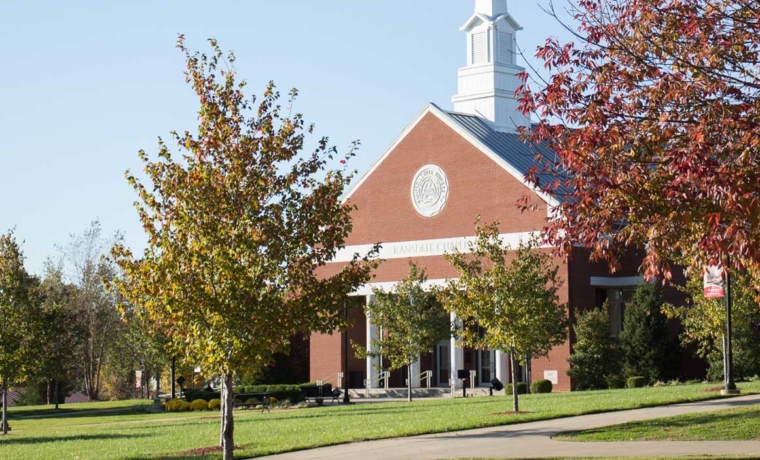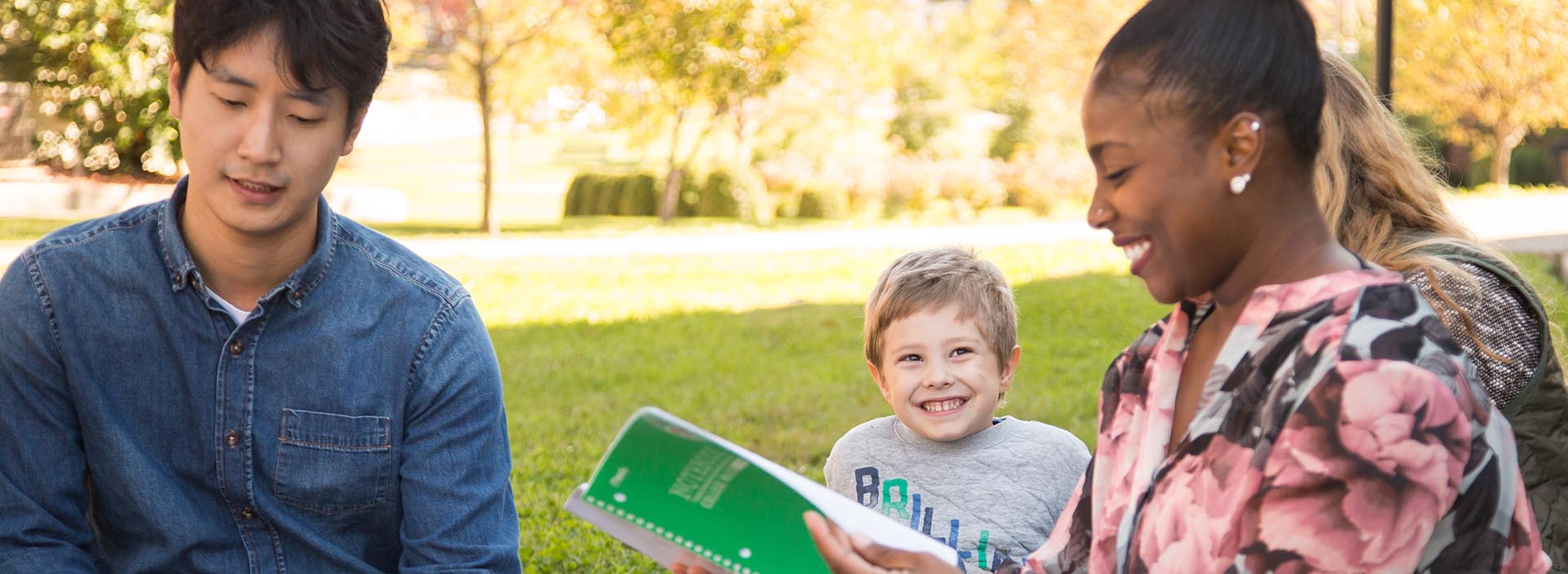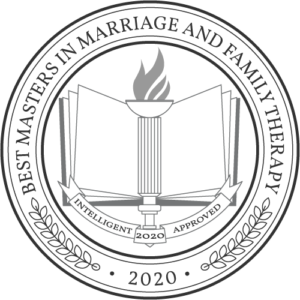
Program Purpose:
The Masters in Marriage and Family Therapy (MMFT) is offered to enhance career opportunities and prepare graduates with the knowledge and skills to counsel individuals, couples and families in a variety of occupational venues.
While enrolled in this program students will examine the philosophical underpinnings that religion, spirituality, philosophy, classical and contemporary theory, social situation, media, biology, and knowledge contribute to the development of mankind. In this process students are stimulated and challenged, using various methods of instruction, to broaden their thinking and interaction with individuals, couples and families. Our efforts prepare graduates to identify, evaluate, develop and explore thoughts and behaviors of them self and those for whom they provide counseling services.
All course work in the MMFT program is designed to fulfill the mission, goals, and objectives consistent with the values of our Christian University. The curriculum of this program has been accepted by the Kentucky Board of Licensure for Marriage and Family Therapists, and meets the strict accreditation requirements of the Commission on Accreditation for Marriage and Family Therapy Education (COAMFTE).
- All Locations
- Los Angeles
- Online
Marriage and Family Therapy Degrees
Campbellsville University Ranks Among Top Master’s in Marriage and Family Therapy Degree Programs for 2020 by Intelligent.com
MFT Program Values
- A Christian commitment to act and serve responsibly
- The promotion of ethical and competent family systems practices
- A commitment to personal growth within a Christian environment
- A respect for diversity among people and other cultures
- A commitment to empower clients and client systems
- Promotion of life-long learning and growth in the marriage and family therapy profession
The Masters in Marriage and Family Therapy (MMFT) requires students to successfully complete 60 credit hours of coursework. The curriculum meets the education requirements of the Kentucky Board of Licensure for Marriage and Family Therapists as outlined in KRS 335.330 (3), and meets the strict accreditation requirements of the Commission on Accreditation for Marriage and Family Therapy Education (COAMFTE). The MFT program is designed to prepare graduates with the knowledge and skills to counsel individuals, couples and families.
Criteria and Processes for Student Admissions
Applicants to the MFT Program at Campbellsville University must meet the University’s Graduate Council requirements in order to be considered for admission. Requirements are:
- A bachelor’s degree from a regionally accredited institution.
- Completion of an application for regular admission to the University Graduate School and acceptance by that body.
- Official transcripts from all undergraduate and graduate courses taken from any college/university.
- Three letters of reference.
- Statement of interest for pursuing an MMFT degree should be a 500-750 word essay that:
- Describe why you want to become a Marriage and Family Therapist.
- Describes how your life experiences have prepared you for the counseling program.
- Describes characteristics you have that make you suitable for the counseling profession
While past professional experiences strengthen an application, no academic credit is given for life experience.
The Admissions Committee consists of the Director of the Marriage and Family Therapy Program and MFT program faculty members. Each member in attendance during the student interview recommends one of the following actions:
- Full acceptance.
- Conditional acceptance, specifying conditions that must be improved or corrected.
- Denial
After application materials are reviewed, a letter of decision, invitation, or both is mailed to the applicant at the address provided on the application.
Applications may be submitted at any time and are reviewed continually. The Marriage and Family Therapy Program allows enrollment during any academic term. Applications are reviewed and interviews scheduled once ALL materials are received by the program. In order to register for courses in your desired term of study, the application materials must be processed and the entrance interview conducted 30 days in advance of the term.
The MMFT Degree features a program designed to meet the education requirements for licensure as a marriage and family therapist in Kentucky (LMFT), and that meets the strict accreditation requirements of the Commission on Accreditation for Marriage and Family Therapy Education (COAMFTE). The 60 credit hour program has a delivery that includes approximately 50% of the academic course work online and the remaining coursework in a face-to-face delivery format. To accommodate non-traditional students, courses are offered in the evenings and meet only one night a week. Courses are scheduled in eight-week terms.
The MMFT program offers a two-year track and a three-year track. Both tracks are considered full-time, as long as there is no break between terms. Students who take two-classes per eight week term will complete the program in two years; students who take one class per per eight week term will complete the program in three years.
Along with challenging and expanding the knowledge of students, this program focuses on relationships. Faculty provides special attention to students and usually learn student names by the end of the first class. Consistent with the mission of Campbellsville University, this program works toward developing life-long Christian servant leaders who will contribute to the betterment of humanity.
Graduate Examination
All MMFT graduates must successfully complete a comprehensive examination consisting of MFT content in order to receive their diploma. Students are eligible to take the comprehensive examination once coursework is satisfactorily completed. Students must pass the comprehensive examination before they participate in graduation activities. A passing score is 70% or higher. If a student does not succeed in their first attempt to pass the examination an analysis of concern areas is conducted and the student is provided an additional opportunity to improve knowledge, skills and their performance.
COAMFTE Graduate Achievement Criteria Data for Campbellsville University
Accredited: November, 2016
Advertised Program Length: 2 year track (two courses every eight week term) or 3 year track (1 course every eight week term). Both tracks are considered full-time for financial aid, as long as no breaks are taken.
Cohort Year Students Entered Program | Number of Students in Program | Advertised Graduation Rate (%)* | Maximum Graduation Rate (%)** | Job Placement Rate (%)*** | Licensure Rate (%)**** |
|---|---|---|---|---|---|
FT | FT | FT | FT | FT |
|
2015-2016 | 16 | 62.5% | 62.5% | 100% | 100% |
2016-2017 | 32 | 81.25% | 81.25% | 96% | 96% |
2017-2018 | 35 | 60% | 60% | 100% | 100% |
2018-2019 | 25 | 60% | 60% | 100% | 100% |
2019-2020 | 38 | 55.2% | 55.2% | 100% | 100% |
2020-2021 | 39 | In Process | In Process | In Process | In Process |
2021-2022 | 54 | In Process | In Process | In Process | In Process |
2022-2023 | 17 | In Process | In Process | In Process | In Process |
*Graduation Rate is the program’s Advertised Length of Completion which is how long the program is designed to complete as written.
**Job Placement Rate is the percentage of graduates from the cohort year that are employed utilizing skills learned in the COAMFTE accredited program.
***Licensure rate is the percentage of graduates from the cohort year that have achieved ANY level of MFT licensure.
For Master’s programs only, COAMFTE has established a benchmark of 70% licensure rate for each cohort.
***”Maximum Graduation Rate” refers to the percentage of students who required the maximum amount of time (7 years) to complete the MFT program***
Faculty
Dale Bertram, Marriage and Family Therapy
BA Eastern New Mexico University – double major in Religion and Speech Communication,
MA Eastern New Mexico University – Religion
MEd Albertson College of Idaho – General Counseling
PhD Nova-Southeastern University – Family Therapy
Licensed Marriage and Family Therapist/ AAMFT Approved Supervisor
Nikki Erwin, Marriage and Family Therapy (Director of MFT Field Education)
MSC Campbellsville University – Marriage and Family Therapy
BS Campbellsville University – Christian Studies
Licensed Marriage and Family Therapist
Kenneth Hollis, Theology/ Marriage and Family Therapy (Program Director)
B.S. University of Louisville – Sociology
M.Div. The Southern Baptist Theological Seminary – Pastoral Care and Counseling
D.Min The Southern Baptist Theological Seminary – Family Ministry
PhD The Southern Baptist Theological Seminary – Christian Counseling/Marriage and Family Studies
Licensed Marriage and Family Therapist/ AAMFT Approved Supervisor
Rahsheeno Griffith, Marriage and Family Therapy
BS Boyce College – Christian Counseling
MA The Southern Baptist Theological Seminary – Biblical Counseling
MS Campbellsville University – Counseling
PhD – University of Louisiana at Monroe – Marriage and Family Therapy
Licensed Marriage and Family Therapist
Scott Wigginton, Theology – Theology/ Marriage and Family Therapy (Assistant Program Director)
BA Western Kentucky University
M.Div. Th.M. & PhD, The Southern Baptist Theological Seminary
Licensed Marriage and Family Therapist/ AAMFT Approved Supervisor
Course Descriptions
MFT500 Marriage & Family Therapy Theories & Practice I………..3 hrs.
This seminar is a survey of the major classical historical theoretical models of the human personality development and their impact upon the development of psychotherapy. Specific application of the theoretical principles of these historical classical models will be investigated, analyzed, and described regarding their implications for understanding human development and the effectiveness of therapeutic intervention(s) across the life cycle. Seminar content includes an emphasis upon these classical theories of individual personality and psychotherapy as they are critiqued by systems theory and a worldview analysis.
MFT515 Introduction to Marriage & Family Studies…………………. 3 hrs.
This course will study the dynamics of marriage and family relationships with emphasis on understanding and assessing their structure and function through a family systems approach. Attending to family developmental life cycle issues, students will learn ways in which counselors may approach marriage and family counseling as a creative, preventative, and healing enterprise. Both theory and techniques of marriage and family counseling are presented and integrated with careful attention given to psychological, systemic, and theological perspectives.
MFT516 Marriage and Family Therapy II ………………………………………. 3 hrs.
This course is an advanced theoretical exploration of the prevailing models for doing marriage and family therapy. Students will explore the historical foundations and evolution of marriage and family therapy as a profession and be exposed to dominant theoreticians and models for the assessment and treatment of marriages and families.
MFT517 Marriage and Family Therapy III…………………………………. 3 hrs.
This course is an advanced exploration of the theory and practice of Cognitive-Behavioral, Narrative, and Solution-Focused approaches to marriage and family therapy with special attention paid to critique and theological integration. The course will address both theoretical underpinnings as well as connections to other therapies in a broader context. Students will learn the skill sets specific to each of these approaches and will begin to learn to apply these in a therapeutic setting, with a particular emphasis on acquisition of skills.
MFT520 Human Development……………………………………………………….. 3 hrs.
A thorough survey of the specified divisions of the life cycle from early childhood to death will be detailed in this course. Topics include life-cycle theories of development, developmental tasks, normal-abnormal behavior, models of moral, intellectual, social and physical development and learning theories will be explored. Counseling strategies for specific concerns in the life cycle will be emphasized.
MFT523 Marriage and Family Therapy Skills………………………………….. 3 hrs.
This seminar provides students with both theoretical knowledge and laboratory honed skills that are necessary for basic counseling with individuals, couples and families. Therefore the seminar is designed to introduce theoretical insights and practical experiential skill development.
MFT530 Research Methods……………………………………………………………3 hrs.
This course is an introduction to research methods and their application to research problems with emphasis on the conceptualization, design, completion, and evaluation of research in counseling. Course content includes an emphasis on the formal descriptions of the interaction between persons and their environments, presentation of a wide variety of designs, analyses, and conceptual approaches. Both quantitative and qualitative methods will be presented in the context of carrying out individual research projects.
MFT535 Crisis Intervention and Trauma Counseling for the MFT …3 hrs.
This course will equip students with insights into the theories. Principles and practices of crisis intervention and trauma counseling. While exploring the impact of trauma and crisis, students will study the etiology and effects of trauma, learn skills useful in assessing and intervening, and make application to specific crisis situations. Special attention will be given to: post-traumatic stress disorder; self-care strategies for the counselor; spiritual concerns; as well as ethical and legal considerations.
MFT540 Group Counseling ………………………………….……………… 3 hrs.
This course explores the principles of group counseling dynamics, group development, theory, and techniques. Course content includes: developing competencies in self-intervention, growth, and competence in processes of small group practice; relationships within the family system and other small group settings; and the kinds and types of groups, with emphasis on methods, problems, and needed skills in working with groups and families in a variety of settings.
MFT545 Premarital and Marital Counseling ………………………………3 hrs.
This course will provide a historical overview of the marriage counseling movement. We will deal with a full range of topics: premarital counseling, marriage enrichment, blended couple counseling, life stage events, and marital therapy. Recognizing the long history of marriage counseling, this course will focus heavily on the more recent research driven models of marriage counseling (primarily John Gottman’s and Sue Johnson models).
MFT550 Marriage and Family Therapy Theories and Practice II………. 3 hrs.
This course develops advanced counseling techniques. Course content includes further psychological perspectives on modern psychodynamic, family, group, and crisis intervention forms of counseling and psychotherapy; theories and practice of brief forms of therapy, as well as long-term methods of treatment; and cross-cultural and gender factors that influence counseling and theory. Students will identify and personalize their own theoretical approach through development, demonstration, and integration of the theories.
MFT560 Psychopathology……………………………………………………………… 3 hrs.
This course is an overview of contemporary perspectives on child and adult psychological disorders. Course content includes: Training in the use of the DSM-IV diagnostic system; examination of the role of culture, ethnicity, gender, and social class in symptom formation and the experience of illness and critical examination of these issues in clinical application of the DSM-IV.
MFT570 Cultural Competencies…………………………………………………….. 3 hrs.
This course is designed to address societal changes, influences and trends, human roles, societal subgroups, social mores, and diversity of life-styles. Other course content includes social change and individual/societal responses, multi-cultural issues, religion, racial issues, ethnicity, gender issues, sexual preference, aging issues, subgroup cultural communication patterns, and methods of addressing the provision of counseling services for these diverse groups.
MFT581 Ethical, Legal, & Professional Issues in Marriage & Family Therapy……………………………………………………………………3 hrs.
This course provides an in-depth study of professional ethics, legalities, and professional issues relating to the professional practice of counseling.
MFT600 Professional Issues for the MFT …………………………………2 hrs.
This course will focus on the personal and professional needs and issues faced by those who are transitioning from being a Marriage and Family Therapy Student to being a Marriage and Family Associate.
MFT624 The Child & Adolescent in Marriage & Family Therapy………..3 hrs.
This course examines the theories, methods, and techniques of counseling and psychotherapy with children and adolescents. Emphasis will be placed on a multidimensional view of intervention with children and adolescents, giving attention to development, cognitive, behavioral, organic, educational, social, and environmental issues, and development of skills in counseling children and adolescents individually and in family therapy. Coordination of services with agencies, the juvenile court system and assessment instruments with adolescents are examined.
MFT681 Addictions Counseling for the MFT……………………………………3 hrs.This course utilizes the strengths perspective to explore the biological, psychological, social and spiritual aspects of addictions and treatment across the lifespan and with special populations. Although there is an emphasis on drug and alcohol addictions, the course will also examine other addictions such as eating, gaming/internet, gambling, etc. Additional key elements include: an exploration of personal beliefs and experiences that may impact practice; analysis of related ethical issues and guidelines; and the historical influences on public policies and laws related to addictions.
MFT690 Practicum………………………………………………………………………..10 hrs.
A field-based counseling experience supervised by a qualified, licensed marriage and family professional at a site selected by special arrangement with the student, the program director, and a mental health agency. Specific emphasis is to place students in direct contact with consumers of marriage and family counseling services. The practicum includes all activities a counselor would perform under proper supervision. It provides the students with an opportunity to develop and apply clinical diagnostic skills and counseling skills in a practical setting. Prerequisites: 18 credit hours of coursework and permission of field director.
MFT699 Graduate Candidacy……………………………………………………….. 0 hrs.
Enrollment in this course number is required for MMFT students who have previously enrolled in the maximum number of practicum credits required for their respective track, but who have not yet completed the required clock hours or evaluations required for a course grade or program completion. Students who are not enrolled in coursework or field or those who have not completed their requirements for graduation, must enroll in graduate candidacy to continue in the MSC program. A student is allowed to enroll in up to 7 consecutive trimesters of Graduate Candidacy.
Careers in Marriage and Family Therapy
- Marriage and Family Therapist
- Crisis Intervention Specialist
- Grief Counselor
- University Counselor
- Religious Based Therapist
- Adolescent Counselor
- University Professor
- Military Counselor
- Legal Consultant
- Nursing and Residential Counselor
- Mental Health Therapist
- Substance Abuse and Addiction Therapist

School of Theology
The Mission of the School of Theology is to Produce World Changers for Christ. We carry out this task with a wholehearted response of gratitude, worship, and stewardship to God as revealed in Jesus Christ.
Learn More

